Educator, Spoken-Word Poet and Former Poet Laureate: Q&A with UTM Alumnus Wali Shah
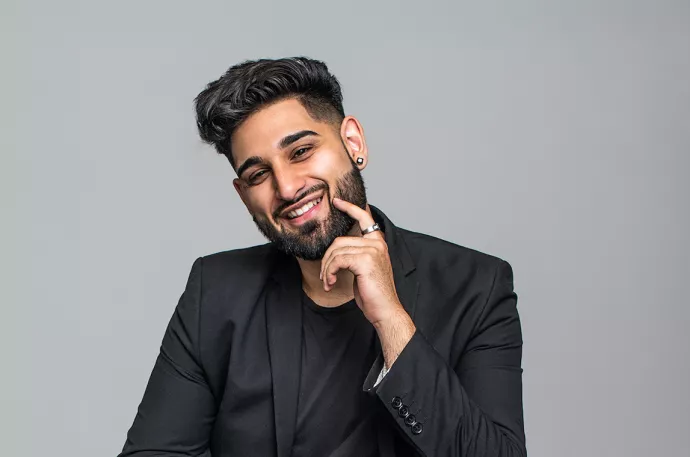
An exceptional public speaker, Wali Shah has held prominent roles, such as Poet Laureate for the city of Mississauga, and he has performed for public figures, including President Obama – all before age 27.
Shah’s context within the South Asian diaspora and his path through adversity are central elements of his work. A sociology graduate, Shah’s poetry centers around topics such as social change and mental health. He is also an avid philanthropist and currently works with schools all over North America, holding introductory poetry workshops that aim to make writing accessible to all students.
Talking about his time at UTM, the classes and teachers that shaped his views and helped solidify his skills, Shah stays connected with his alma mater and gives back generously. Most recently, he connected to UTM by reaching out to speak to the class of 2020 about the complicated times in which they were graduating.
Continuing to create poetry, he is also currently working on his first novel. Fictional, but based on his own experiences growing up in Canada, it promises to be inspirational for many readers of diverse backgrounds.
Let’s start at the beginning: can you tell us a little about your personal background, where you are originally from, your path to Toronto, and into UTM?
My country of birth is Pakistan; my family and I came to Canada – intially Toronto – when I was three years old. I moved to Mississauga when I was nine.
My parents were always talking about U of T, its amazing reputation and that it was the best university in Canada. Growing up, the idea of attending university seemed out of reach, and telling them that I wasn’t sure I wanted to go to university was really hard for them to hear. Plus, I had early ambitions to be an artist and my parents and I argued a lot about that as they didn’t consider it a career path that could financially support me.
Going to U of T didn’t seem to be in my cards, but then, in my last year of High School, I managed to get my grades up and had some really inspiring teachers. I started to think that maybe I want to be a teacher, maybe a social science teacher, be a role model to other immigrants, and maybe be able to give back in the same way my teachers gave to me.
UTM was just 20 mins away from my house and I could take the bus there, which meant I didn’t need to spend much. The good thing about Mississauga and UTM, besides the diversity and the sense of community I had there, was that I felt like I was able to really lay my roots for the work that I was doing around poetry and philanthropy. Mississauga is full of opportunity; there’s less noise and more space, not as much going on, but just enough!
Can you tell us a bit more about your experience growing up in Toronto and Mississauga as an immigrant?
It wasn’t easy – my family struggled financially, and, of course, my parents had to learn a different language. Then, experiencing 9/11 at a young age very much shaped me. 9/11 quickly became synonymous with Muslims, including South Asians, even non-Muslims who had ethnic names or an immigrant background. I experienced bullying and a lot of discrimination until moving from Toronto to Mississiauga at age nine. There, I found more of a community, more Muslims, more representation, but still faced some of the same challenges.
I had a tough time growing up in a Muslim home within a non-Muslim country. And I often felt alone in my struggles and questions, not knowing how to explain the challenges I was facing to my parents who might consider some topics taboo. For example, how do you talk about sex before marriage to someone from a culture of arranged marriages? Or how do you talk about the intricacies of religion and why people believe what they believe? The diaspora and my identity within it affected me deeply, and I had to figure a lot of things out on my own.
Fortunately, I was lucky to have great teachers. My high school teacher, Ms. Melanie Riley, took the time to talk to me and, seeing that I was already interested in hip hop and rap music, she introduced me to poetry. Explaining to me that RAP is actually an acronym which stands for ‘rhythm and poetry’ – which I found eye-opening – she gave me this poetry book by Tupac Shakur. Like most people, I didn’t know that he did poetry, and I noticed that, in his poetry work, there was no swearing, no derogatory language toward women, and a lot of social issues were covered. What my teacher did was to engage me with culturally responsive pedagogy, and it helped me find a path despite being between identities.
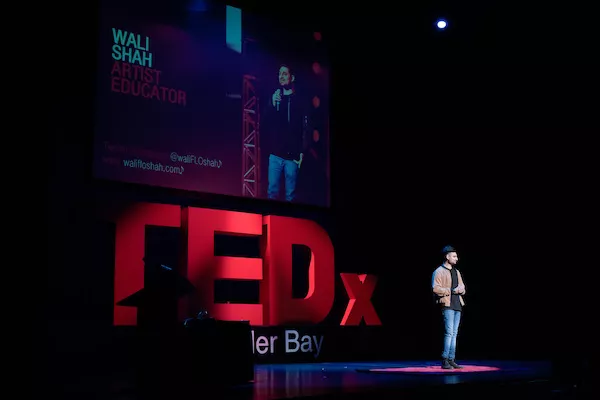
You are quite open about the fact that you were arrested at the age of 15; how did this part of your personal history shape your path and your work?
So, that was just before Ms. Riley gave me the book. As I mentioned before, I had a lot going on in my mind, and not a lot of people to talk to. Through mass media and society in general, I was influenced by a sense of toxic masculinity, which, of course, is something I only learned about later, at university. I was going through a rebellious phase during which I wouldn’t listen to my parents. Anger, aggression and aspiring to be like the men I saw in movies and music videos led me to act out. Being arrested at age 15 was a wake-up call. I realized that there was something wrong with what society was telling me, that I had a choice. So, even though it was a traumatic experience, it ultimately helped me mature and grow tremendously.
That leads me to my next question which is about your interest in writing and, specifically, poetry. How did that continue to develop after high school?
There was an elective course at UTM, Expressive Writing (WRI 203) with Rahul Sethi, a professor who was young and cool and from a relatable background, that particularly helped me develop my writing skills.
But, my field of study was Sociology and Political Science, and what I was learning in those classes inspired me to write; it gave me deeper insight and understanding into topics I already cared about. Professor Jayne Baker in the Sociology Department taught a course called Sociology of Masculinities (SOC347). She was such a great teacher – I wish all male UTM students would take that class! I wrote a poem for the final exam in that class, titled Dear Future Son, recorded a video of myself performing it, and was subsequently invited to be a TEDx speaker in Mississauga, where I performed that poem and talked about toxic masculinity.
This goes a bit into my next question: topics you write about include mental health and social change. What is the one most urgent or important change you’d like to see in our society right now?
The most important change I’d like to see is people coming together more; not just tolerance, but empathy for one another. I think any major issue our world is facing right now is rooted in a combination of arrogance and ignorance, of people choosing not to understand each other, of preferring a society that divides humans, rather than looking at similarities.
I think about how much we can learn about the Black experience, the Black community, their history, and the racism that they’ve experienced. I think about how much Islamophobia could be prevented if people decided to learn more about a religion rather than just absorbing selective news articles. Also women – especially women; how much we can learn from their role in a human history that subordinated them.
If we drop our arrogance, we can begin working on ridding ourselves of ignorance and start from a place of empathy. I think that’s what would make our world a better place!
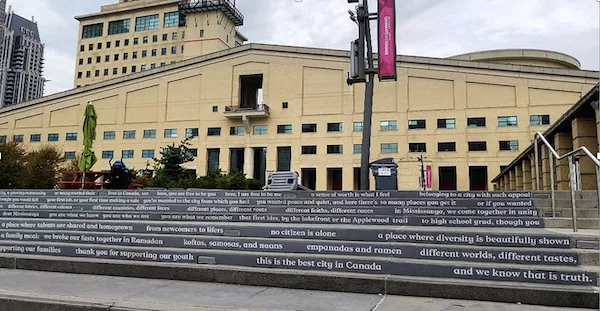
A few years ago, you were appointed Poet Laureate for the city of Mississauga. Can you tell us more about this unique position and what it entailed?
Yes, I was still a student at the time. It’s a civic position that they offer to one selected poet in the community who writes and performs at different public events such as Canada Day, New Year’s Eve, and so on. It was a great opportunity! One of the greatest honours was that one of my poems, which was about the people of Mississauga and the different cultures they represent, was featured on the steps of City Hall!
You are currently working with schools, making poetry accessible to students. Can you tell us more about that?
Yes, I’m currently working with schools – grades 4 through 12 – all over North America, presenting and holding workshops on poetry. Currently, I present virtually, but prior to the pandemic, I travelled to schools in person and I loved the international aspect. I was also invited to a conference in Switzerland where I presented, and really enjoyed that experience.
My workshops for schools are introductory. The essence is helping students share their story. The thing about poetry is that it is very financially accessible. When you think about many sports, for example, you need equipment. Even for a sport like soccer, you need, at a minimum, a field and a ball. With poetry and writing, all you need is a piece of paper and a pencil. It’s the most financially accessible resource an educator can use.
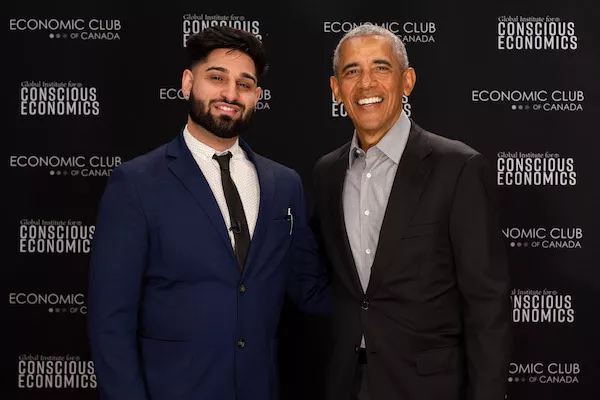
You have performed alongside famous artists such as Selena Gomez and Kendrick Lamar, and you have received numerous recognitions and awards; is there a moment that was most special?
There are two! The first was when I graduated from UTM. This was a very special moment for me, but maybe even more for my mom, whose dream it was that I graduate from U of T. Sitting in convocation hall, she had an even bigger smile on her face than I! And, after I received my diploma, I gave her a big hug and saw that she was crying, and she turned to me and said, “This is why I came to Canada, to see this moment as a mother.” I was very moved by this as this is exactly the vision of so many immigrant parents: the relief she felt in knowing that I was going to be okay, that I now had an education. Of course, my mom immediately collected herself to add that, next, I should go for my Masters and then PhD!
The second most special moment was this: performing for President Barack Obama at an event in Toronto in January 2020. Getting to meet him, shaking his hand – that was a big honour for me!
Are there some fond memories you could share from your time at UTM? You mentioned some of your classes, but anything else you remember fondly?
Playing on the basketball team was a lot of fun for me! Besides that, what stands out is just all the great people that I got to meet, especially my professors, many of whom I keep in close touch with. Jayne Baker, from Sociology is one that I mentioned; Ken Derry from the History Department is another.
On the days I felt stressed, taking a walk on campus and enjoying the nature, seeing the deer, is a great memory. UTM is such a great place to be, and I just enjoyed being there; I miss the campus very much!
What advice do you have for incoming UTM students?
My biggest advice is: talk to your professors during office hours. They are experts in the field you are studying, have written books about the subjects you are already interested in – talk to them!
At your own initiative you spoke to the graduating class of 2020 last June. Thanks for that! What was it about these difficult pandemic times that inspired you to do that?
I was thinking about my own ceremony; how I had looked forward to it for so many years, and I kept thinking how difficult and sad it must be to not be able to have that moment with your friends and family. I also wanted to leave the graduating class with the message that their sacrifice is saving people’s lives.
There’s so much we all learned from COVID-19, especially to appreciate our health, but also the opportunity that education creates. Even though the graduating class couldn’t have an in-person convocation, they had opportunities that many people around the world don’t have: attending classes, having a classroom, and all the learning that happens there.
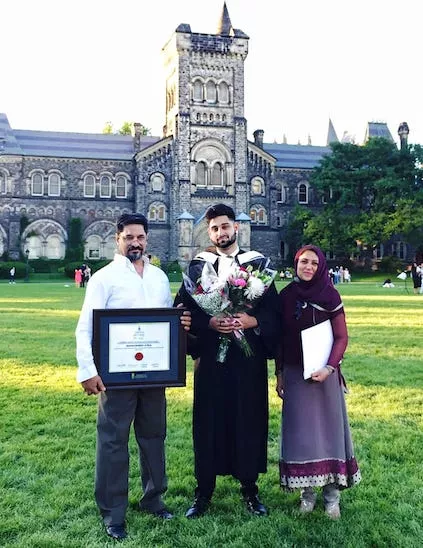
You recently posted a poem on the occasion of International Women’s Day. Can you tell us more about the women in your life that shaped and inspire(d) you?
My mom is a typical South Asian immigrant hero to me. She struggled all her life and worked really hard to put food on the table for her family, and to be there for them. I know that she could have had an easier, more comfortable life, had she stayed in Pakistan, but she moved here for better opportunities for her children.
Some of the female teachers and professors that I mentioned before, were important in shaping me. And I also think about my 15-year-old sister, how smart she is, and how important it is that I’m a good role model to her. But, I also use my voice to influence my brothers and other young men, trying my best to set an example around respecting women.
Besides all the remarkable speaking engagements you have, as well as your work with schools, what else are you currently working on?
I’m actually working on a book right now – my first book! It’s a collaboration with children's writer Eric Walters who is a recipient of the Order of Canada. It is a fictional story, loosely based on my personal experiences. It’s about a young Muslim boy and his struggles as an immigrant, his close friendship with a Christian, Canadian boy, and the community he finds in Canada with all its diversity. The story will resonate with anyone who has experienced discrimination.
So, that’s one of my main projects right now, but I’m also working on poetry, of course, with the goal of publishing a poetry book. Those are my two big projects right now.
Learn more about Wali Shah: www.lifeaswali.com.



